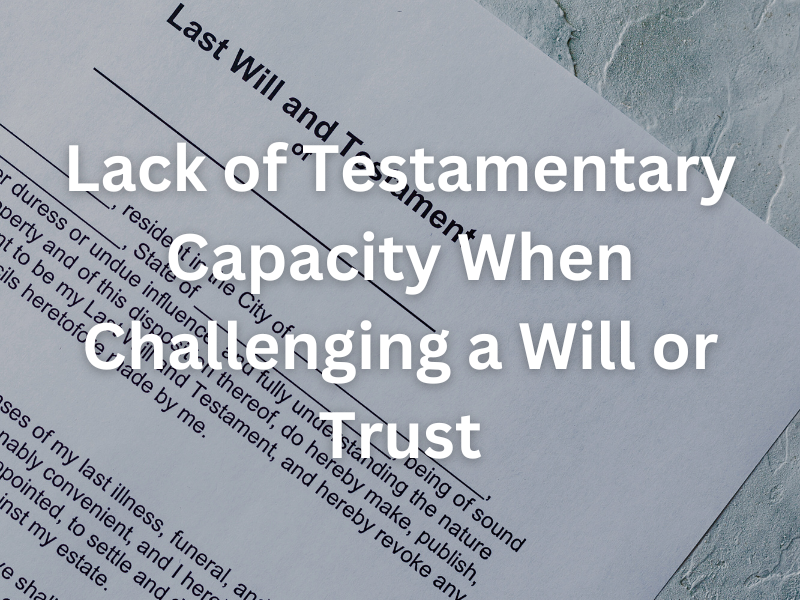
A last will and testament is central to estate planning. It provides legal documentation of your wishes after your death and/or if you become incapacitated. A valid will directs how property held by a decedent’s estate will be distributed after his or her death.
Often, as part of estate planning, an individual or a couple will establish a trust to take ownership of certain assets and administer their disbursal to named beneficiaries of the trust. A trust may offer tax advantages and efficiencies. Assets within an irrevocable trust pass outside of probate.
The attorneys at Albertson & Davidson, LLP help individuals and families in California resolve disputes involving wills and trusts. We often handle cases in which issues are litigated regarding undue influence and lack of sufficient capacity by the person who created or modified a will. A beneficiary who has been disinherited by changes to a will or trust may pursue a challenge based on the legal grounds that the person lacked testamentary capacity when he or she changed the designated beneficiaries to a will or trust. For a will or trust to be legally valid, the person who established it must have had the requisite capacity to know what he or she was doing.
California courts presume that a will or trust is valid, so a challenge has a high burden of proof to be successful. If you think you have legal grounds for contesting a will or trust in California, the legal team of Albertson & Davidson is available to review your situation and discuss your legal options. We have earned a reputation for our skilled handling of complex inheritance litigation and for our aggressive approach in courtrooms across California. Our Los Angeles probate lawyers will fight for you if your inheritance is at risk.
Contact us today to discuss how to contest a will or trust in California based on a lack of testamentary capacity or undue influence. Phone (877) 632-1738 or reach out online for a free and confidential consultation.
Determining Mental Capacity Requirements for Creating a Will or Trust
 The person who establishes a will or a trust must be of sound mind when he or she signs documents to create a will or trust.
The person who establishes a will or a trust must be of sound mind when he or she signs documents to create a will or trust.
California law presumes that a person has testamentary capacity to execute a will. California Probate Code (§ 6100 (2022)) says any individual 18 or more years of age who is of sound mind may make a will. Therefore, an individual contesting a will on the basis of a lack of mental capacity would have to prove that the individual was of unsound mind and did not have the capacity to establish the will. An experienced will contest attorney understands the kind of medical records and other evidence needed to establish a persuasive case of lack of testamentary capacity.
Probate Code (§ 6100.5 (2022)) states further that an individual is not mentally competent to make a will if either of the following is true:
- The individual does not have sufficient mental capacity to be able to do any of the following:
o Understand the nature of the testamentary act.
o Understand and recollect the nature and situation of the individual’s property.
o Remember and understand the individual’s relations to living descendants, spouse, and parents, and those whose interests are affected by the will.
- The individual suffers from a mental health disorder with symptoms including insane delusion or hallucinations, which result in the individual’s distributing property in a will in a way that the individual would not have done if not for the mental health disorder.
Until recently, trusts have been regulated more like contracts, with higher standards for the mental capacity required to conduct business. But this has begun to change as more people have established trusts as a part of their estate planning.
In 2011, the California Court of Appeal partially reversed a lower court’s finding that the capacity to make and amend a trust required a higher standard of mental capacity than is required to establish a will. In Andersen v. Hunt, [196 Cal. App. 4th 722], the Court said if the provisions of a trust are analogous to the designation of beneficiaries and other determinations typically set forth in a will, then the lower mental capacity requirements set forth in Probate Code Section 6100.5 shall apply.
Legal Framework for Contesting a Will or Trust
To contest a will or trust, an individual must be an interested party. Interested parties include:
- Any beneficiary named in the current will or trust or a previous will or trust
- A deceased person’s legal heirs under California’s intestacy laws of succession (for example, a spouse, children, parents, and siblings)
- The deceased’s unpaid creditors.
A will or trust contest lawsuit would be filed in the California probate court in the county where the person who created the will or trust had resided. There must be a petition seeking to admit the last will to probate before you can file a petition contesting the will.
The contest petition would state the basis for challenging the will or trust and present evidence supporting the assertion of lack of mental capacity as defined in California Probate Code. A typical will or trust contest petition asserting lack of testamentary capacity would provide the testator’s medical records and depositions as evidence showing that the person changed or signed a will or trust documents while mentally incompetent due to:
- Illness such as dementia
- Injury (traumatic brain injury)
- The influence of alcohol or illicit drugs
- The influence of prescribed pharmaceuticals
Advanced age, feebleness, or erratic behavior are not grounds on their own for a lack-of-capacity claim.
There are several steps in the legal process of challenging a trust or contesting a will in California. Either may be settled in a courtroom trial with the formal presentation of evidence, witness testimony, cross-examination of witnesses, and the court’s decision.
In many trust and will contests, the judge will order the two sides to enter mediation to try to resolve such cases without a trial. In mediation, a neutral third party meets with the parties to a lawsuit and their attorneys to help them identify areas of agreement and work toward an equitable settlement.
Albertson & Davidson Can Help You Contest a Will or Trust
 If you have concerns about a recently deceased individual’s will or trust in California that names or should name you as a beneficiary of the decedent’s estate, you should consult the inheritance litigation attorneys of Albertson & Davidson, LLP. We can provide sound guidance and personalized legal assistance throughout the legal process.
If you have concerns about a recently deceased individual’s will or trust in California that names or should name you as a beneficiary of the decedent’s estate, you should consult the inheritance litigation attorneys of Albertson & Davidson, LLP. We can provide sound guidance and personalized legal assistance throughout the legal process.
Our founding attorneys, Stewart Albertson, and Keith Davidson, are aggressive trust and will inheritance litigators whose law practice focuses on these types of complex cases. Our legal team has recovered more than $250 million in verdicts and settlements for our deserving clients.
Albertson & Davidson, LLP maintains offices in Los Angeles, the Bay Area, Orange County, and Silicon Valley to serve clients throughout California. We stand. We fight. We win.
Contact us today for a free and confidential consultation.

